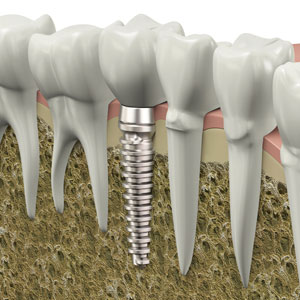 It is common to compare a complete set of teeth to a string of pearls; when one is missing, the whole strand begins to fall apart. In reality, your teeth function more like an athletic team; they have hard work to do, and when one is missing, the remaining team members must assume a greater workload.
It is common to compare a complete set of teeth to a string of pearls; when one is missing, the whole strand begins to fall apart. In reality, your teeth function more like an athletic team; they have hard work to do, and when one is missing, the remaining team members must assume a greater workload.
It’s because of this dynamic relationship that dental implants play such an important role in your oral health. When one or more of your natural teeth are unable to perform their duties, an implant can serve as the artificial replacement to ensure that the workload is still divided fairly.
More importantly, dental implants don’t need help or support from the remaining teeth. Just like a sports team, the replacement or substitute must be able to step in and perform its duties to perfection without leaning on another team member for help. An implant is sustained only by the strength of the jawbone and does not require any additional attachments or connections to the surrounding teeth.
Why is this high level of teamwork so critical to your oral health? The contributions of each tooth keep the other teeth from working too hard. A single missing tooth increases the force that the remaining teeth are subjected to as you bite or chew. It contributes to an uneven and premature wear pattern, and the force also traumatizes the gum tissue and supporting bone.
Attempting to chew without a complete set of teeth can lead to sensitivity, recession, and broken fillings. Missing teeth also create unnatural gaps and spaces that enable the remaining teeth to tilt and lean out of place. This unhealthy alignment is often responsible for pockets under the gums, food traps, and cavities. Beyond problems that affect the teeth, the lack of balance is strenuous to the jaw joint and increases the risk that you will develop TMJ problems.
You have the ability to preserve the health of your natural teeth when you choose dental implants. Arrange an appointment with our periodontists today to learn more.


